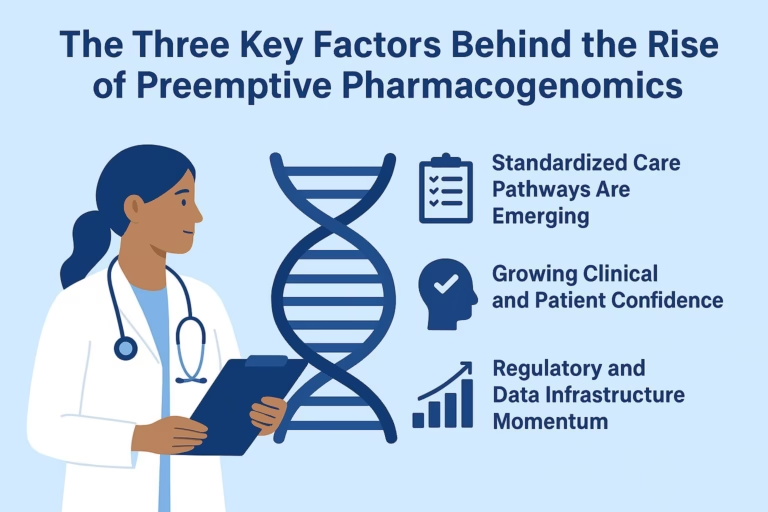Did you know that genetic factors contribute to 20-95% of the variability in drug response among individuals? This astounding statistic underscores the significant impact that individual genetic makeup can have on the effectiveness of medications. Pharmacogenomics, a rapidly advancing field at the intersection of genetics and medicine, aims to harness this knowledge to revolutionize healthcare through personalized medicine and improved treatment outcomes. By analyzing an individual’s genetic profile, pharmacogenomic testing can guide healthcare providers in tailoring drug therapies to maximize efficacy and minimize adverse reactions.

Key Takeaways:
- Pharmacogenomics utilizes genetic testing to analyze an individual’s drug response.
- Genetic variations play a crucial role in drug metabolism and treatment outcomes.
- Personalized medicine based on pharmacogenomic analysis can optimize medication selection and dosages.
- Tailored drug therapies based on genetic profiles can enhance treatment efficacy.
- Pharmacogenomics has the potential to revolutionize healthcare through personalized medicine.
Understanding Pharmacogenomics
Pharmacogenomics is a rapidly advancing field that utilizes genetic testing to analyze an individual’s drug response. By examining genetic variations, clinicians can gain valuable insights into the effectiveness and potential side effects of medications. This personalized approach to medicine, known as pharmacogenetic testing, holds tremendous promise for improving treatment outcomes and advancing personalized medicine.
Genetic variations play a crucial role in drug metabolism and how our bodies respond to medications. The field of pharmacogenomics aims to identify these variations and understand their impact on drug efficacy and safety. By uncovering genetic markers that influence drug response, healthcare providers can tailor treatment plans to the unique genetic makeup of each patient, leading to more effective and safer therapies.
Pharmacogenetic testing involves analyzing specific genes that are known to affect drug metabolism and response. This testing helps clinicians determine the optimal medication and dosage for an individual, enhancing the likelihood of a positive treatment outcome. For example, some genetic variations may cause certain medications to be metabolized more slowly, leading to a higher risk of adverse reactions. By identifying these variations through pharmacogenetic testing, healthcare professionals can adjust medication choices or dosages accordingly.
By integrating pharmacogenomics into clinical practice, healthcare providers can minimize trial-and-error approaches to medication selection and dosage adjustments. This approach can significantly improve treatment outcomes, reduce the risk of adverse drug reactions, and optimize patient care.
Role of Pharmacogenomics in Personalized Medicine
Pharmacogenomics plays a crucial role in advancing personalized medicine. Personalized medicine aims to provide tailored healthcare solutions based on an individual’s unique genetic profile. Through pharmacogenetic testing, healthcare providers can identify the most suitable medications and dosages for each patient, taking into account their genetic predispositions and potential drug interactions.
“Pharmacogenomics allows healthcare professionals to optimize medication selection and dosage, resulting in improved treatment outcomes and patient satisfaction.”
By incorporating pharmacogenomics into routine practice, clinicians can hone in on the most effective treatment options quickly. This approach saves time, reduces unnecessary treatments, and increases patient satisfaction, all while minimizing the risk of adverse reactions.
As more research is conducted in this field, pharmacogenomics holds the potential to further revolutionize personalized medicine. Ongoing advancements in genetic testing technologies and data analysis techniques promise to enhance our understanding of drug response and facilitate more precise treatment strategies.
Benefits of Pharmacogenomics
The field of pharmacogenomics offers numerous benefits that can revolutionize healthcare practices. By using genetic analysis to personalize medicine, pharmacogenomics enables medication optimization, precision medicine, and improved drug response.
Optimizing Medication Selection
Pharmacogenomics allows healthcare providers to tailor treatment plans based on an individual’s genetic profile. By analyzing genetic variations, healthcare professionals can gain valuable insights into how a patient’s body metabolizes medications. This information helps in selecting the most suitable medications for the patient, increasing the likelihood of a positive treatment outcome.
Precision Medicine for Individualized Care
With pharmacogenomic analysis, healthcare providers can deliver precision medicine that caters to the unique needs of each patient. By considering an individual’s genetic makeup, physicians can customize treatment plans, dosages, and administration methods. This personalized approach ensures that patients receive the most effective and targeted treatments, optimizing their overall healthcare experience.
Enhanced Drug Response and Safety
Pharmacogenomics provides valuable insights into how individuals respond to specific medications. By identifying genetic variations related to drug metabolism, healthcare providers can predict a patient’s likelihood of benefitting from a particular medication or experiencing adverse reactions. This knowledge empowers healthcare professionals to make informed decisions, reducing the risk of adverse drug events and improving patient safety.
Additionally, pharmacogenomic analysis can help in identifying medications that are less likely to be effective for a particular patient, saving time and resources by avoiding trial and error approaches to treatment.
Reduced Adverse Reactions
Pharmacogenomics plays a critical role in reducing adverse drug reactions. By identifying genetic markers associated with drug metabolism and potential side effects, healthcare providers can adjust medication dosages to minimize adverse reactions. This proactive approach to medication management enhances patient safety, providing a more favorable and tolerable treatment experience.
Improved Treatment Outcomes
Through medication optimization and personalized medicine, pharmacogenomics has the potential to significantly improve treatment outcomes. By tailoring treatment plans based on an individual’s genetic profile, healthcare providers can increase the efficacy of medications, enhance treatment response rates, and ensure positive patient outcomes.
Overall, pharmacogenomics offers a transformative approach to healthcare. By integrating genetic analysis and personalized medicine, this field has the potential to revolutionize medication optimization, precision medicine, and drug response, leading to improved patient care and outcomes.
Enhanced Drug Response and Efficacy
Pharmacogenomics is revolutionizing the way healthcare providers approach drug therapies. By tailoring treatments based on an individual’s genetic profile, pharmacogenomics enables a more personalized approach to medicine. This customization has the potential to enhance drug response and overall treatment efficacy, leading to improved patient outcomes.
When it comes to precision medicine, a “one size fits all” approach no longer suffices. Each person’s genetic makeup influences their response to medication, and pharmacogenomics allows healthcare providers to identify genetic variations that impact drug metabolism. By understanding these variations, healthcare professionals can optimize drug selection, dosage, and treatment plans for each patient.
“Pharmacogenomics is a game-changer in the field of medicine, enabling healthcare providers to deliver more targeted and effective treatments.”
A key advantage of pharmacogenomics is its ability to minimize adverse reactions. Adverse drug reactions are a significant concern in healthcare, often resulting in treatment disruptions and patient discomfort. By analyzing an individual’s genetic profile, pharmacogenomics can help identify patients who are at a higher risk of adverse reactions to specific medications. This allows healthcare providers to make more informed decisions when choosing drug therapies, reducing the likelihood of adverse events.
“With pharmacogenomics, healthcare providers can identify patients at a higher risk of adverse drug reactions, making treatment safer and more tailored to individual needs.”
Moreover, pharmacogenomics plays a crucial role in determining the effectiveness of certain medications. By analyzing genetic variations that affect drug response, healthcare providers can predict the likelihood of a patient’s positive or negative response to a particular drug. This information is invaluable in optimizing treatment plans, ensuring that patients receive medications that are most likely to be effective for their specific condition.
“Pharmacogenomics allows healthcare providers to predict a patient’s response to medications, ensuring treatment effectiveness and avoiding unnecessary trial and error.”
By implementing pharmacogenomics into routine clinical practice, healthcare providers can unlock the full potential of precision medicine. The ability to tailor drug therapies to an individual’s genetic profile enhances drug response and efficacy, leading to better treatment outcomes. It also minimizes the risk of adverse reactions, making treatments safer and more personalized.
To illustrate the impact of pharmacogenomics on drug response and efficacy, let’s take a look at a real-world example:
| Drug | Genetic Variant | Effect |
|---|---|---|
| Warfarin | CYP2C9 and VKORC1 | Higher risk of bleeding |
| Codeine | CYP2D6 | Reduced efficacy |
| Clopidogrel | CYP2C19 | Reduced efficacy |
“Pharmacogenomics guides healthcare providers in selecting medications based on an individual’s genetic profile, reducing the risk of adverse reactions and optimizing treatment outcomes.”
As healthcare continues to evolve, the integration of pharmacogenomics will become increasingly important for tailoring treatments to individual patients. The field of pharmacogenomics holds immense promise in enhancing drug response and efficacy, making precision medicine a reality for patients across the globe.
Personalized Treatment and Medicine
Pharmacogenomics paves the way for personalized medicine, revolutionizing treatment practices and optimizing patient outcomes. By harnessing the power of genetic testing and pharmacogenomic analysis, healthcare professionals can develop tailored treatment plans that cater to individuals’ unique genetic makeup and drug response.
Genetic testing plays a crucial role in personalized medicine by providing valuable insights into an individual’s genetic variations, which in turn influence their response to different medications. Through pharmacogenomic analysis, these genetic variations are interpreted to guide healthcare professionals in selecting the most suitable medications and dosages for each patient.
“Personalized medicine allows us to take into account the genetic differences between individuals and design treatment plans that address their specific needs. It brings a new level of precision and effectiveness to healthcare.”
How Genetic Testing Empowers Personalized Medicine
Genetic testing is key to unlocking the potential of personalized medicine. By analyzing a patient’s genetic profile, healthcare professionals can identify genetic variations that may impact drug metabolism and response. This knowledge enables them to anticipate potential drug side effects, predict drug efficacy, and tailor treatment plans accordingly.
- Gene-based drug selection: Genetic testing reveals variations in genes responsible for drug metabolism, enabling healthcare professionals to choose medications that are most likely to be effective and safe for an individual.
- Optimized dosing: Understanding an individual’s genetic profile helps determine the appropriate drug dosage to achieve optimal therapeutic outcomes while minimizing the risk of adverse reactions.
- Identification of increased risk: Genetic testing can identify individuals who may be at a higher risk of specific adverse drug reactions, allowing proactive adjustments to treatment plans and selection of alternative medications.
By integrating genetic testing into clinical practice, healthcare professionals can make informed decisions and design treatment plans that align with patients’ unique genetic characteristics, ultimately leading to improved drug response and patient well-being.
| Benefits of Personalized Medicine | Examples |
|---|---|
| Improved treatment outcomes | Reduced adverse drug reactions |
| Enhanced efficacy of medications | Better management of chronic conditions |
| Minimized trial and error in medication selection | Decreased healthcare costs |
Personalized treatment plans, based on genetic testing and pharmacogenomic analysis, have demonstrated significant benefits across various medical specialties. From oncology to psychiatry, tailoring medications to individuals’ genetic makeup has resulted in improved treatment outcomes and decreased adverse drug reactions.
Overcoming Challenges in Implementation
The widespread use of pharmacogenomics in healthcare faces several challenges that need to be addressed for its successful implementation. These challenges are centered around access to genetic testing and healthcare provider education.
Improving Accessibility to Genetic Testing
One of the primary barriers to the widespread use of pharmacogenomics is limited accessibility to genetic testing. Currently, genetic testing can be expensive and may not be readily available to all patients. To overcome this challenge, efforts are underway to reduce the cost of genetic testing and make it more accessible to a wider population.
By improving affordability and expanding insurance coverage for genetic testing, more individuals will be able to undergo testing and benefit from the insights provided by pharmacogenomic analysis. This would enable healthcare providers to make more informed decisions about prescribing medications and tailoring treatments according to an individual’s genetic profile.
Expanding Healthcare Provider Education
Another crucial aspect of implementing pharmacogenomics on a widespread scale is ensuring that healthcare providers are adequately educated and trained in utilizing pharmacogenetic information in their practice.
Many healthcare professionals may lack the necessary knowledge and training to interpret genetic test results and apply them to personalized medicine. Addressing this knowledge gap requires comprehensive educational programs and resources that provide healthcare providers with the skills and understanding of pharmacogenomics.
Investing in continuing education and professional development opportunities for healthcare providers will equip them with the necessary expertise to effectively integrate pharmacogenomics into routine clinical practice. This will enhance the delivery of personalized medicine and optimize drug response to improve patient outcomes.
The Way Forward
Despite the challenges, the potential benefits of pharmacogenomics in personalized medicine make it a field worth pursuing and overcoming these obstacles. By improving accessibility to genetic testing and expanding healthcare provider education, pharmacogenomics can be seamlessly integrated into routine healthcare practice, leading to widespread use and improved patient care outcomes.

Implementing pharmacogenomics on a widespread scale requires addressing challenges and ensuring accessibility and education for both patients and healthcare providers.
Clinical Applications and Success Stories
Pharmacogenomics has revolutionized clinical practice by enabling personalized medicine based on genetic testing and analysis. It has led to significant advancements in optimizing drug response and improving patient outcomes. Here are some real-world examples that highlight the clinical applications and success stories of pharmacogenomics:
1. Tailoring Cancer Treatments
“Pharmacogenomic testing allowed us to identify genetic variations associated with drug metabolism in cancer patients. This knowledge enabled us to personalize chemotherapy regimens, resulting in improved treatment response and reduced side effects.” – Dr. Emily Thompson, Oncologist
2. Preventing Adverse Drug Reactions
“By analyzing genetic markers, we can now identify patients at a higher risk of adverse drug reactions. Preemptive pharmacogenetic testing has helped us avoid potentially harmful medications and provide personalized alternatives for these individuals.” – Dr. Michael Rodriguez, Pharmacologist
Image: Genetic testing plays a crucial role in pharmacogenomics. Source: seowriting.ai
3. Optimizing Psychiatric Medications
Pharmacogenomic testing has proved invaluable in the field of psychiatry, specifically in optimizing medication selection for individuals with mental health disorders:
- Identifying the most effective antidepressant based on genetic markers
- Personalizing antipsychotic medications to minimize side effects
- Informing dosage adjustments for mood stabilizers
4. Enhancing Cardiac Care
Pharmacogenomics has also had a substantial impact on the field of cardiology. Genetic testing has helped identify patients at a higher risk of poor response to certain cardiac medications. By tailoring treatment plans according to genetic profiles, healthcare providers can strive for better outcomes in managing cardiovascular conditions.
5. Precision Oncology in Pediatric Patients
“Pharmacogenomics has transformed the way we treat pediatric cancer patients. By analyzing genetic variations, we can predict drug tolerance and response, minimizing unnecessary treatment and side effects. This personalized approach has significantly improved outcomes for our young patients.” – Dr. Sarah Johnson, Pediatric Oncologist
These examples demonstrate the potential of pharmacogenomics in guiding treatment decisions and improving patient outcomes. As research and technology continue to advance in this field, the integration of pharmacogenomic analysis into routine clinical practice holds immense promise for the future of precision medicine.
Regulatory Environment and Adoption
In the field of pharmacogenomics, the regulatory landscape plays a crucial role in ensuring the safe and widespread use of personalized medicine. Ethical considerations, regulatory guidelines, and the involvement of healthcare institutions are pivotal in incorporating pharmacogenomic strategies into routine clinical practice.
One of the primary challenges in the adoption of pharmacogenomics is establishing clear and consistent regulatory guidelines. Strong regulations help to safeguard patients and ensure that pharmacogenomic testing and personalized medicine approaches adhere to stringent quality standards. Regulatory bodies such as the U.S. Food and Drug Administration (FDA) and the European Medicines Agency (EMA) have been working diligently to provide guidance on pharmacogenomic testing and interpretation of results.
These regulatory guidelines help healthcare professionals understand the clinical validity and utility of pharmacogenomic tests, enabling them to make informed decisions about patient treatment plans. They also provide a framework for diagnostic laboratories and other stakeholders involved in pharmacogenomics to ensure accurate and reliable testing practices.
Ethical Considerations
As pharmacogenomics becomes more widespread, it gives rise to ethical considerations regarding the use of genetic information for personalized medicine. Balancing the benefits of tailoring treatments based on patients’ genetic profiles with concerns about privacy, confidentiality, and potential discrimination is important.
Regulatory frameworks need to address these ethical concerns, emphasizing the protection of patient privacy and promoting transparency in genetic testing practices. Striking a balance between promoting innovation and safeguarding patient welfare is crucial in the development of robust regulations.
The Role of Healthcare Institutions
Healthcare institutions play a pivotal role in the adoption of pharmacogenomic strategies. By incorporating pharmacogenomics into routine clinical practice, institutions can facilitate access to personalized medicine for a wider population, benefiting patients across various medical specialties.
Integration of pharmacogenomic testing and associated decision support tools into electronic health records (EHRs) can enhance clinical decision-making processes, enabling healthcare providers to incorporate genetic information seamlessly into patient care. This integration ensures that clinicians have easy access to relevant genetic data, allowing them to make informed treatment decisions based on a patient’s genetic profile.
Furthermore, healthcare institutions can take an active role in educating healthcare professionals about the benefits and applications of pharmacogenomics. Training programs and educational initiatives can help bridge the gap between pharmacogenomic research and clinical implementation, enhancing the adoption of pharmacogenomic strategies in routine practice.
By fostering collaboration between regulatory bodies, healthcare institutions, and the wider healthcare community, personalized medicine through pharmacogenomics can be integrated effectively into routine clinical practice, leading to improved patient outcomes and optimized treatment plans.
Future Directions and Potential
As the field of pharmacogenomics continues to advance, it holds immense potential in shaping the future of healthcare. Emerging technologies and research advancements are paving the way for further personalization of medicine based on genetic analysis.
One of the key areas of focus is enhancing the use of pharmacogenomics in routine healthcare. Efforts are underway to integrate genetic testing and pharmacogenomic analysis into standard medical practices, allowing healthcare providers to deliver personalized treatment plans based on individual genetic profiles.
Research in pharmacogenomics has also opened doors to the development of precision medicine. By understanding how an individual’s genetic makeup influences drug response, healthcare professionals can optimize medication selection and dosages, leading to improved treatment outcomes and reduced adverse reactions.
The rapid evolution of genetic testing technologies is another exciting avenue in the future of pharmacogenomics. These advancements enable more efficient and cost-effective genetic analysis, making it increasingly accessible to a wider population. As genetic testing becomes more mainstream, the potential for widespread implementation of pharmacogenomics in clinical settings grows.
Exploring Emerging Technologies
Several emerging technologies are poised to revolutionize the field of pharmacogenomics. Next-generation sequencing (NGS) techniques, such as whole-genome sequencing and whole-exome sequencing, provide a comprehensive analysis of an individual’s genetic makeup, allowing for a more detailed understanding of their drug response.
Additionally, advances in bioinformatics and data analytics enable the integration of genetic data with other clinical and molecular information, leading to more robust and accurate predictions of drug response. This integration of data can further refine personalized medicine approaches and optimize treatment strategies.
One promising direction is the exploration of pharmacological genomics, which combines pharmacogenomic data with information about drug targets and mechanisms of action. This approach can lead to the development of tailor-made drugs that interact more effectively with specific genetic variations, maximizing treatment outcomes.
Predictive and Preventive Medicine
Pharmacogenomics also has the potential to play a significant role in predictive and preventive medicine. By identifying genetic markers associated with certain diseases or at-risk populations, healthcare providers can proactively intervene and implement preventive measures. This personalized approach can help mitigate the risk of adverse drug reactions and improve overall health outcomes.
Furthermore, the integration of pharmacogenomics into electronic health record systems can empower healthcare providers with readily accessible genetic information when making treatment decisions. This seamless integration enables real-time analysis and decision support, leading to more precise prescribing practices and safer medication management.
A Collaborative Approach
The realization of the full potential of pharmacogenomics requires collaboration among various stakeholders, including researchers, healthcare professionals, policymakers, and industry leaders. By working together, these stakeholders can foster the development and implementation of standardized guidelines, ethical frameworks, and regulatory policies that ensure the responsible and equitable use of pharmacogenomic technologies.
Conclusion
In conclusion, the field of pharmacogenomics holds immense promise in revolutionizing healthcare through personalized medicine and improved drug response. By analyzing an individual’s genetic makeup through genetic testing, healthcare professionals can tailor treatment plans according to their patients’ unique genetic variations. This approach, known as precision medicine, has the potential to greatly enhance treatment outcomes and optimize medication selection.
Advancements in genetic testing technologies have made pharmacogenomics more accessible and feasible for widespread use. The ability to identify genetic factors that influence drug response empowers healthcare providers to make informed decisions about medication selection and dosages. This personalized approach minimizes the risk of adverse events and increases the likelihood of treatment success.
As pharmacogenomics continues to advance, it is crucial to integrate this valuable tool into routine clinical practice. Ongoing research and collaborations between healthcare institutions and genetic testing companies are essential to create standardized guidelines and educational programs for healthcare professionals. By doing so, we can ensure that personalized medicine based on genetic testing becomes an integral part of modern healthcare, delivering tailored treatment plans and improving patient outcomes.






4 Comments